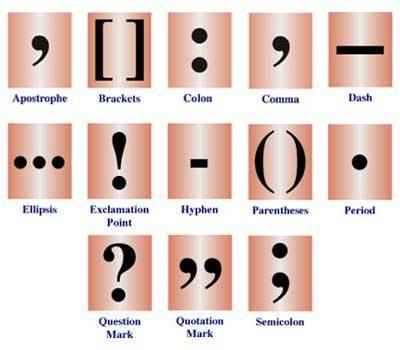
一、句点
1.句点用于当一句话完全结束时。
2.句点也可以用于英文单词的缩写。如:Mrs. | Dr. | P.S. 等。但要注意的是当缩写的字母形成了一个单词的时候就不要使用句点。如:IBM, DNA 等。
二、问号
问号要用在一个直接的问句,而不是间接的。
如:How will you solve the problem? 是正确的用法,但用在I wonder how you will solve the problem?就不对了,应该使用句点而不是问号。
另外,在客气的用语中,也是用句点而不是问号。
如:Will you please give me a call tomorrow.
三、感叹号
感叹号用于感叹和惊叹的陈述中,在商业写作中要注意感叹号的应用,因为不恰当的使用会显得突兀及不稳重。
四、分号
1.与中文一样,分号用于分隔地位平等的独立子句。在某些情况下,使用分号比使用句点更显出子句之间的紧密联系,另外分号也经常与连接副词 thus, however, therefore一起使用(放在这些词语之前)。
如:I realize I need exercise; however, I’ll lie down first to think about it.
2.在句子中如果已经使用过逗点,为了避免歧义的产生,就用分号来分隔相似的内容。
如:The employees were Tom Hanks, the manager; Jim White, the engineer; and Dr. Jack Lee.
需要注意的是:一个完整的句子以大写字母开始,以句点结束。写英文时用逗点代替句点、分号、冒号或破折号叫“逗号错”,这正是中国学生所要避免的。
请比较下列例句:
错:It was raining hard, they could not work in the fields.
(上面句子中划横线的部分是两个不同的主语,而且逗点前后的句子是完整的-----单独拿出来都能代表一个完整的意思。因此,用逗号违反了英文规定,即一个句子只能有一套主干。)
对:It was raining hard; they could not work in the fields.
It was raining hard. They could not work in the fields.
It was raining so hard that they could not work in the fields.
They could not work in the fields because it was raining hard.
It was raining hard, so they could not work in the fields.
As it was raining hard, they could not work in the fields.
错:The essay is poorly organized, there is no central idea.
对:The essay is poorly organized; there is no central idea.
The essay is poorly organized: there is no central idea.
五、冒号
1.冒号用于对后面内容的介绍或解释。如:This is her plan: go shopping.
2.冒号用于名单之前,特别是一个竖排的名单。
We transferred three employees to new branches:
·Tony Wang to New York City
·Mike Jackson to Tokyo
·Mark Foster to Paris
当名单横排的时候,冒号要用在一个完整的句子之后。如:We need seven people: three students, three engineers, and a professor.
3.冒号用于一个正式的引用之前。
如:The professor said: “It was horrible.”
4.冒号也可用于商业或正式信函的称谓后面。
如:Dear Mr. Lee:(美国英语中,信件或演说词的称呼语之后用冒号,而在英国英语中多用逗号。)
5.冒号用于数字时间的表示。
如:16:45 或 4:45 p.m.
6.冒号用于主标题和副标题之间。
如:Web Directory: World and Non-U.S. Economic Data
六、逗点
1.逗点用于分隔一系列的简单内容。
如:I will go to Shanghai, Beijing, and Shenzhen.
2.逗点用于修饰名词的多个形容词之间。
如:a small, fancy bike
3.逗点用于连接两个较长的独立子句,而且每个句子的主语不同。
如:The Grizzlies were out of timeouts, and Miller missed a desperation 3-pointer as time expired.
4.逗点用于关联的子句之间。
如:Since he’s your younger brother, please take care of him.
5.逗点用于一个较长的修饰短语之后。
如:In the middle of the coldest winter on record, the pipes froze.
6.逗点用于直接引用的句子之前。
如:Mary said, “Let’s go fishing.”(注意:这里说的和上面提及的冒号在直接引语中的使用不一样。如果是引用比较正式的发言讲话就要用冒号,一般情况下就用逗点。)
如果句中含有间接引用就不需要逗点。
如:Mary said we should go fishing.
在反问句之前要使用逗点。如::
He worked very hard, didn’t he?
以上是比较常用的标点,下面列出一些次常用的标点:
七、连字号
1.连字号主要用于某些前缀(如: self-,ex-和all-) 后和构成复合词。如:
ex-husband(前夫),brand-new(全新的),poorly-dressed(衣着破烂的)
I have forty-thousand or fifty-thousand dollars.
I want to obtain the whole-year or half-year lease of the apartment.
当两个或两个以上复合词并用, 而各复合词连字号后的部分相同时, 各复合词的相同部分只出现一次,应改为the whole-or half-year lease.
2.用于区分同一词源
3. 当某复合词中出现重复的字母或过多的元音, 使阅读困难时, 可用连字号把前缀和词根分开。
non-nuclear, re-use, semi-independent
4. 构成某些复合数字(在英文写作中,100以下的数字应该用英文单词写出来,不可用阿拉伯数字代替)
twenty-one during the years 1949-1999
有时, 用作名词的分数可以不用连字号, 但所有用作形容词的分词均须加连字号。
如: one fourth [ 也可one-fourth ] of those surveyed
5.用于一个词的一部分要移行, 一般按音节间断开单词加连字号(例如:ha-ppy,不可断为hap-py……),或根据发音,不要把单个字母留在行尾或行首。注意一页中最后一个单词不能使用连字号将其置于两页。
八、圆括弧
1.标出表顺序的数字和字母(如: (1) 、(2) 等)
2.用来表示其中插入的或附加的解释成分。这个插入成分可以是单词、词组或句子.但要注意,括号会削弱强调作用,因此,如果要强调插入的句子成份,则要用破折号。
They might take a walk together(remember feet) and see the neighborhood with fresh , new eyes.
九、引号
引号分单引号(single quotation marks) 和双引号(double quotation marks) 。单引号只用在一个直接引语中所含有的另一个直接引语上。
1. 表示直接引语。当直接引语超过四行或多于40 个字词时, 一般不用引号而改用黑体字以便与文章的其它部分界线清晰
“Well, ”the foreigner said to him ,“ you look like an engineer. ”
句号和逗号必须置于引号(双引号和单引号) 之内。
He told the gunman ,“I refuse to do that ”;his knees , however , were shaking even as he said those words.
She called this schedule of activities her “load ”:work , study , exercise , recreation , and sleep.
冒号与分号必置于引号外。
The teacher asked , “Could you understand me”?
Did the teacher ask ,“Have they gone”?
Did the teacher ask ,“They have gone ?”
The frightened girl screamed ,“Help”!
The fellow only said ,“Sorry !”
He interrupted me , “Now , listen”——and went on saying.
问号、感叹号和破折号有时置于引号之内, 有时置于外号之外。如果所引内容本身是疑问句或感叹句或带有破折号, 问号、感叹号或破折号一般放在引号之内。否则,放在引号之外。
2. 标明短篇出版物的标题, 诸如杂志、报纸上的文章、短诗、短篇故事和整部书的某一章节。
Have you read“The Old Man and the Sea”?
Chapter three is entitled“The Internet . ”
3.表示所用的词语具有特殊意义。另外,当俚语出现在较正式的文章中, 也用引号引起来, 以表示文风的有意转变。
The report contained the“facts”of the case.
The speaker owns a“fat farm”in California , which slims down rich overeaters for $2 , 500 a week.
4. 用于表示引起读者注意的词语, 或读者不熟悉的特殊词语。
It is customary to say“Youpre welcome” whenever anyone says“Thank you. ”
“SOS”is a message for help from a ship or aircraft when in danger.
十、省略号
此省略号无论出现在句首、句中、还是句尾,都是表示单词的省略。
1. 表示直接引语中的省略
Max wrote ,“...in one word ,manps consciousness , changes with every change in the conditions of his material existence....”
句后的省略号和句号的写法应是在一条直线上的四个黑点。前三个黑点表示省略号,后一个黑点表句号。
2. 表示说话中的犹豫或迟疑
“If that the way you think...just go back to school ,”he said.
3. 表示段落或整行词句的省略, 须使用一整行黑点。
十一、撇号或省字号
1.构成名词所有格
rest my son’ s
a moment’s books
A three weeks’pay
2.表示词、字母、数码、符号等的复数形式
Don’t use so many ands in the sentence.
How many 5s have you got?
这与一般单词的复数形式不同, 正规的写法须在s 前加“ ’ ”, 要牢记规则。
3.除表动词的紧缩形式外, 还表一个或几个字母和数字的省略。
I’ve got it. “Yes ,ma’ am ,”the waiter said.
注意:有相当大一部分省略词是口语中的用法,不宜出现在书面语中。例如:I’d like to(在书面语中要写作I would like to)
十二、 字底线和斜体
斜体是英语的一种独特的书写手段, 但具有标点的作用,它和字底线的作用完全一样。
1. 用于火车、飞机、轮船、太空船的名称之下
Challenger (飞机) Apollo Nine(太空船)
2. 用于具有一定厚度的书籍、报纸、杂志、长诗、电影、作曲的标题下
Have you read Gone with the Wind ?
在书写体中,长篇小说书名下要加字底线,如是印刷体写成斜体即可。
the Washington Post Time magazine
3.表示不常用的或还没有被英语这一语言所接受的外来词或短语。但外来语中的动植物科目须用字底线来表示。
In Korea , the sixty-first birthday is calld huan gup (beginning of new life) 1 He longed for
La dolce vita.
4. 强调文章中的某些词语,以引起读者的注意, 相当于汉语中的着重号(即在所强调的汉字下加一个黑点) 。
- 平方米符号怎么打㎡
- 五线谱符号
- 桃心符号爱的信号
- 网名太土了想换一个更个性的,谁那里有符号网名大全花样符号?
- 好看的符号
- 爱心符号怎么打 利用爱心符号让自己的聊天充满色彩
- 漂亮符号
- 爱心符号起源
- 音乐符号
- 翅膀符号
- 星座符号
- 包含于符号
- 符号心
- 桃心符号
- 特殊表情符号
- 个性符号
- 乐谱符号
- 好看的符号
- 音乐符合大全学习的方法
- 漂亮心形符号
- 漂亮的符号
- 王者荣耀特殊符号
- 爱心符号大全
- 插座符号如何使用
- 喇叭符号代表着什么意思?
- 溧组词
- 溨
- 溩
- 溪
- 溪亭
- 溪侥
- 溪僥
- 溪光
- 溪刻
- 溪卡
- 十九
- 十九个
- 十九日
- 十二
- 十二个
- 十二位
- 十二使徒
- 十二分
- 十二卷
- 十二宫
- 孕妇跳河
- 梦见下大雨被淋
- 梦见山路崎岖
- 梦见着火逃生
- 梦见火山爆发逃命
- 怀孕生子
- 孕妇梦到花生地
- 公路
- 梦到水稻
- 女人梦到给自己刮胡子